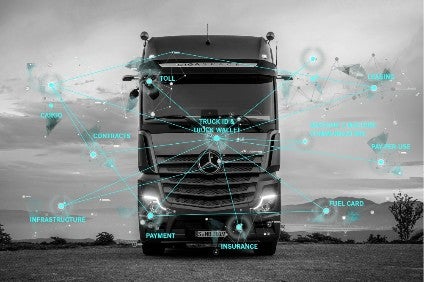
With the newly created digital Truck-ID and associated Truck Wallet, Daimler Trucks in a pilot project successfully carried out an automatic payment at an electric charging station.
Trucks can identify themselves to other machines using their Truck-ID as if they had their own integrated ID card and can thus provide a unique signature for specific processes.

Discover B2B Marketing That Performs
Combine business intelligence and editorial excellence to reach engaged professionals across 36 leading media platforms.
The Truck Wallet works as a platform technology and central user programme for all applications which can access the Truck-ID for various purposes.
Truck-ID and Truck Wallet – both currently still in the prototype phase – are stored as encrypted software programs within a cryptographic processor.
This processor is part of the Truck Data Centre, the central telematics control unit.
Helge Koenigs, head of the Truck Wallet project at Daimler Trucks, said: "We have laid the foundation for autonomous interaction between trucks and other machines – a true technological milestone. Our aim is that, in future, trucks will be able to act on their own behalf in various fields of application. Drivers can then concentrate more on their actual driving tasks and haulage firms benefit from a significant reduction in administration work and more secure processes. This renders it practically impossible to carry out such things as fuel card scams whereby criminals copy a fuel card and spy on the PIN number being entered. Also in terms of highly automated trucks, our prototypes show the direction in which such further developments can go."
The Truck Wallet can hold cash for payments and additional cards such as fuel cards and loyalty cards – all in digital form. The electronic information, which also includes any cash added, is stored directly in the Truck Wallet and can then be transferred to other machines by means of a Wi-Fi connection. This process is secured by means of checks on an online system. The radio technology is a component of the Truck Data Center.
Besides automation of processes, the biggest advantage of carrying out transactions with the Truck Wallet comes in conjunction with the Truck-ID. The Truck-ID digitally signs all processes of the Truck Wallet and thus serves as a confirmation that the transactions were actually made with the corresponding truck.
In conjunction with specific telematics data which are additionally stored, such as the current location of the truck, this system offers logistics companies and their business partners a high level of protection against scams. Generation of the individual Truck-ID is carried out using a proven asymmetrical cryptographic procedure. The secret component of the Truck-ID is thus unknown to Daimler Trucks, the suppliers of the processor and the Truck Data Center or the haulage firms themselves.
In co-operation with Commerzbank and its research and development unit, Daimler Trucks has carried out a fully automated payment process with a truck system. A fully built up truck was not needed for this; as part of the pilot testing, the appropriate truck components – mainly the Truck Data Center including the Truck-ID and Truck Wallet – were sufficient. Commerzbank is currently the only bank in Germany to have developed an e-payment system for this purpose. It is based on Corda, which is an established blockchain platform technology for transactions. As part of the payments process, real money in digital, encrypted form is added to the Truck Wallet of the truck system in the form of e-euros. After a payment is made by the Truck Wallet, the money is uniquely identifiable thanks to the Truck-ID and is then transferred to the recipient. The recipient can then request Commerzbank to transfer this e-money back to its own account. The transaction is validated and stored online by Corda. In this way, the truck owner can trace whether one of its vehicles has effected a payment. This process is already legally possible today as the system fulfils all requirements of the German Federal Financial Supervisory Authority (BaFin). As part of this, the electronic cash is covered by means of a billing account with Commerzbank and any suspicious transactions can be detected and, in the case of doubt, be submitted to BaFin.
There is a broad range of additional possible applications for the Truck-ID and Truck Wallet:
Processing of truck tolls could become drastically easier: to date, truck drivers must manually enter data in the toll system, whereby errors can occur. It would be possible to use this new technology so the truck directly provides the toll system with the data with a unique signature by means of a Wi-Fi connection. This would save truck drivers and haulers a good deal of time, stress and money.
Freight processes could take place directly via the truck itself: the truck carries the freight papers digitally and signs these when it arrives at the destination and receives an appropriate confirmation for the receipt of the goods from the system there.
Truck-ID and Truck Wallet can also partially take over controlling and billing of subcontractors by proving when the truck was used by which user – to this end, all that would be required by the user is a suitable technological counterpart, such as a smartphone with an appropriate app which is able to communicate with the Truck Wallet.
Processing of vehicle leasing and short-term use contracts (eg pay-per-use) can be controlled directly from the truck itself: customers pay directly at the vehicle and the truck decides for itself whether the required conditions for operational readiness are fulfilled.
Daimler Trucks continues to drive forward the development of the Truck-ID and Truck Wallet together with co-operation partners and is already planning further piloting and testing of the technology.






